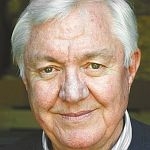( Host) The 16 month old crisis in Syria may be moving toward the end of more than four decades of Assad family rule. But as commentator and veteran ABC News foreign correspondent Barrie Dunsmore explains, what would replace the Assad regime is very uncertain.
Host) The 16 month old crisis in Syria may be moving toward the end of more than four decades of Assad family rule. But as commentator and veteran ABC News foreign correspondent Barrie Dunsmore explains, what would replace the Assad regime is very uncertain.
(Dunsmore) Despite Republican criticism for not doing so, President Barack Obama has not approved supplying lethal weapons to the Syrian rebels. That’s because what is now lumped together as the Free Syrian Army is a very mixed bag with mostly unknown agendas. If Assad were to leave tomorrow, no one really knows what would happen next.
In a report this week in the Washington Post, U.S. officials described the Free Syrian Army as a disorganized front – not nearly as cohesive as Libya’s Trans National Council was during the uprising there last year. According to the Post, the CIA has not been able to establish a significant presence of its own in Syria. It’s having to rely on American electronic intercepts and surveillance – and on information from neighbors such as Saudi Arabia, Jordan, Turkey and Israel. While each may have good sources – they all have their own political objectives. For instance, Israel is most concerned about the Muslim Brotherhood taking over the Syrian revolution – while Jordan and Turkey worry more about cross-border contagion.
This past week Syria confirmed that it had chemical and biological weapons. A senior government official promised Syria would not use such weapons against its own rebels – but threatened they could be deployed against any foreign military intervention. This was not news to American intelligence. But the fear that al-Qaeda or its allies might acquire chemical and biological weapons in the chaos of a sudden collapse of the Assad regime is a major American concern.
Fighting in Damascus escalated last week after rebels assassinated four top Syrian national security officials including the president’s brother-in-law. And this week for the first time in the conflict, Syrian Air force MIG jets went into action – bombing and strafing rebel positions in Aleppo, the country’s largest city. Meantime, more high ranking military officers have defected to the rebels. And diplomacy in the United Nations and elsewhere continues to be stymied by the Russians.
This month the Red Cross formally concluded that with nearly 20,000 dead in 16 months, Syria is engaged in “civil war.” And that war could take a still more deadly sectarian turn. The Assad ruling regime of forty plus years is almost all Alawite – a small off-shoot of Shia Muslims, which makes up only about 12 percent of Syrians. They’ve had support from some wealthy Sunnis and the relatively small Christian community. Other Syrian minorities include Druze and Kurds. But the majority of Syrians are Sunni Muslims who have a history of enmity with the Alawites. In short, the situation is ripe for bitter sectarian warfare.
To see what that can lead to, we have only to look next door to Iraq. Last Monday, in the highest death toll in more than two years, more than 100 Iraqis died in a new outbreak of sectarian killings. And if that’s not depressing enough, reports suggest this may mean al-Qaeda in Iraq, is back in business.